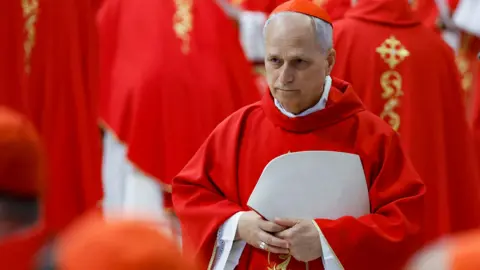Robert Prevost has recently taken the helm of the papacy, becoming the 267th occupant of the revered throne of St. Peter, and will henceforth be known as Pope Leo XIV. His election has drawn significant attention, particularly as he is recognized as the first American to assume this illustrious role. However, his deep-rooted ties to Latin America, where he spent extensive years engaged in missionary work in Peru before rising to the position of bishop, paint a portrait of a leader who embodies diverse cultural influences.
Born in Chicago in 1955, Prevost has a rich heritage with Spanish and Franco-Italian roots. His path to the papacy began with his ordination as a priest in 1982. A mere three years later, he left his native U.S. to serve as a missionary in Peru—an experience that would shape his outlook and mission. Even as he settled in Peru, he frequently returned to the United States to serve in pastoral roles, ensuring his connection with both his home and adopted communities remained strong. Over time, he acquired Peruvian nationality and earned a reputation for his commitment to marginalized populations, striving to build bridges within and between communities.
Prevost’s leadership experience is extensive, having spent a decade as a parish pastor while also contributing his knowledge as an educator at a seminary in Trujillo, situated in northwestern Peru. His dedication to social justice, especially concerning the underprivileged, marked him as a crucial figure in addressing issues of inequality, poverty, and social inclusion.
Upon ascension to the papacy, Pope Leo XIV expressed a deep admiration for his predecessor, Pope Francis, acknowledging the lasting impact of Francis’s leadership. His inaugural remarks, which resonated with heartfelt sentiment, emphasized unity: “United and hand in hand with God, let us advance together,” he proclaimed. This statement, delivered to an enthusiastic crowd outside St. Peter’s Basilica, signified his intention to continue the legacy of compassion and outreach established by his predecessor.
Having served as the prefect of the Dicastery for Bishops in Latin America, Prevost’s election to the papacy was met with some expectation, especially as 80% of the cardinals participating in the conclave were appointed under Pope Francis. This indicates a continuity within the papal leadership that mirrors the prevailing sentiments and reforms of the past pontificate. Prevost’s experience as a pastoral leader, combined with his recent responsibilities as an archbishop and cardinal, equipped him with the necessary insights to navigate the challenges awaiting him in his new role.
As Pope Leo XIV, Prevost is likely to champion the ongoing reforms endorsed by Pope Francis, particularly concerning the Church’s approach to migrants, environmental concerns, and poverty alleviation. His track record includes engagements that reflect a progressive stance on social justice issues and a willingness to challenge political figures, such as the U.S. Vice-President JD Vance, regarding contentious matters like deportations.
Acknowledging the nuances within the Catholic Church itself — particularly in the wake of recent sexual abuse scandals — Prevost’s appointments and policies as pope may further demonstrate his commitment to fostering a Church that openly confronts its challenges while remaining rooted in outreach and reform. The Vatican has emphasized the importance of a leader possessing a “prophetic spirit,” suggesting that Pope Leo XIV is poised to bring hope to the faithful in an era marked by complexity and sometimes despair.
In conclusion, as the first American pope who has also spent significant time serving in Latin America, Prevost’s election heralds a chapter of continuity and progressive reforms for the Catholic Church. The anticipation surrounding his papacy suggests that many will be closely observing his actions and policies as he seeks to guide the Church towards a more inclusive and compassionate future.



